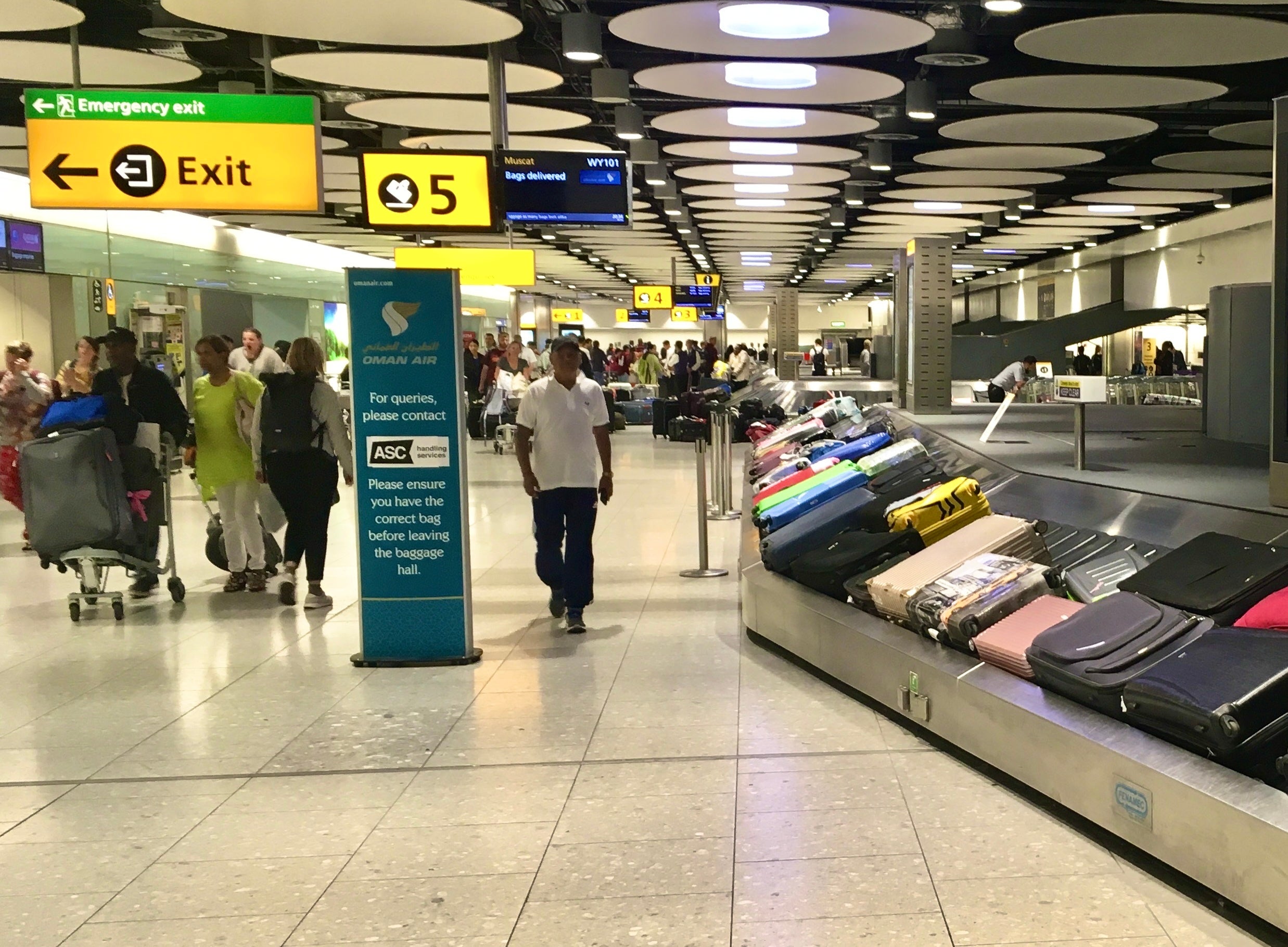Will my daughter need an ETA to fly from Cork to Edinburgh?
Simon Calder answers your questions on South Korea’s second city, the risks of checking in luggage, being stranded in Madeira, and overzealous airlines


Q A question regarding the UK’s ETA (electronic travel authorisation) scheme. I am planning to meet up with my daughter in Edinburgh. She is Luxembourgish but lives in the Republic of Ireland and will be flying from Cork to Edinburgh and back. My understanding is that the ETA is not required for travel within the common travel area. But I am concerned about airlines being overzealous in their interpretation of the rules at the boarding gate. What are your thoughts?
Martin D
A From Wednesday 2 April, most foreign visitors to the UK will need an ETA. This online permit, which costs £10 (soon to be £16), is required by those who currently do not need a visa to visit the UK.
Fortunately your daughter is one of relatively few people who are exempt. As you say, the common travel area – comprising the UK, Ireland, the Isle of Man and the Channel Islands – confers extra rights on anyone who has the good fortune to be Irish, as well as foreign visitors who are resident in Ireland.
The Irish government says: “Legal residents of Ireland, from a nationality that does not usually need a visa to visit the UK (eg European and US nationals), do not need an ETA when traveling within the common travel area, if they can show proof of legal residency.”
I understand your concern about airlines being overzealous in their interpretation of the rules – we have seen many such cases in the context of post-Brexit passport arrangements.
In my experience, though, checks for flights between Ireland and Great Britain are much more relaxed – as they should be, given the freedom of movement the common travel area confers.
Your daughter could usefully take proof of her residence in Ireland, but I would be surprised if she is asked to show it.
Incidentally, one concern of the UK government is that many holidaymakers in Ireland will stray across the border into Northern Ireland, even though they don’t have an ETA. There will be no routine checks.

Q I saw you say on BBC Rip Off Britain that when you check luggage in for a flight, you have to assume that you’ll never ever see it again. Why did you say that?
Rhianna J
A I urge passengers to presume their checked-in bag will vanish. That advice aims to put them in the right mindset when packing for a trip by air. When you check in a bag for a flight, you are reliant on the airline and the ground handlers transporting it safely and securely to your destination. Your luggage is very likely to travel on the same flight as you and appear on the baggage carousel at the far end.
Unfortunately, this doesn’t always happen: a leading budget airline tells me that one in 2,000 of its passengers’ bags goes astray. That is on a “point-to-point” carrier; when you book a connecting flight via a big hub airport, the chances of your possessions being misrouted multiply. According to the latest report by the aviation data specialists at Sita, seven bags go missing for every 1,000 checked in.
When luggage fails to appear on cue, there is no need to panic. Most passengers are reunited with their stray bags within a few days, with the airline delivering it to their home or holiday location. Sometimes, though, baggage can simply disappear. The bag’s label and all other identification might be torn off while passing through the baggage system. (I urge people to tape a label with their contact details inside their case because at least then baggage handlers can open it and trace the owner.) Or the bag may be stolen from the carousel; at most airports there is no need to “reconcile” each item with the passenger’s luggage tag, so villains can swipe a suitcase and scarper.
Whatever the cause, every day thousands of people learn their possessions are presumed lost forever. That is annoying if all the bag contains is unwashed laundry; for priceless possessions, the experience can be heartbreaking. I almost always travel with cabin baggage only – especially on a trip involving a change of plane. If you have to check stuff in, then choose a direct flight if one is available and is not too expensive. And keep everything important in your hand luggage.

Q I am travelling with friends to Seoul, South Korea, next month. They are really keen on making a day trip to Busan. It’s recommended online but most of the bloggers say you need at least two days. Unfortunately, we only have time for a day trip. Should we go for it?
Olivia C
A For anyone who loves cities, Seoul is an excellent choice: startling modern architecture, tranquil temples and a huge number of dining possibilities, almost all serving excellent food at implausibly low prices. All of this applies equally to South Korea’s second city, Busan, which has the advantage of being a port city thereby increasing the allure by a couple of notches. But I side with the bloggers: it is more than 200 miles away, and the very fastest train takes two and a half hours each way, meaning the trip will subtract five hours of your precious sightseeing time in Korea and give you no time to enjoy the nearby beaches that are an essential part of the Busan experience.
That’s not to say a day trip would be unrewarding. You can absorb the metropolitan energy and enjoy the diversity of the waterfront (Busan is much closer to Japan than to Seoul). Be hypnotised by the hyperactive harbour. Then go a short way east to Oryukdo Skywalk, sticking out from a cliff. Eating is an essential part of the Busan experience: try the excellent seafood or dwaeji gukbap (a pork soup).
Perhaps, though, I can steer you towards an easier (and much cheaper) day trip that you can do on city transport from Seoul. It is a triangular excursion that you should start with a half-hour train journey south to Suwon: a smaller city, with an impressive fortress offering walks along the walls. Look out for street art, and walk back to the station along the canal path.
Suwon station is on the extremely expansive Seoul Metro, and you can skirt around the capital on your way to the city of Incheon – a journey of around 80 minutes. The older parts of the city are scenic and include a substantial Chinatown. Once you have had your fill of serenity, back on the Metro and the ride into Seoul.

Q We were stuck in Madeira last month when the inbound plane from Belfast diverted to Gran Canaria, where it stayed overnight. We finally got home 30 hours late. Jet2 has rejected our compensation claim, citing “extraordinary circumstances”. Should we fight on?
Malcolm D
A Bluntly, no. Anyone tempted to fly to or from this exquisite Portuguese island should be aware that there is a small but significant chance that their flight may not keep to schedule. Every month or so, in my observation, Madeira’s spectacular airport closes to arriving aircraft due to adverse Atlantic weather. The runway is partially built on stilts and is exposed to high winds from the ocean.
Holding on the ground for hours before departure to Madeira is not unknown, and neither is diverting to the Canary Islands or mainland Portugal. In your case, the aircraft waited in Belfast for the Madeira weather to improve, then flew to the island – only for the pilots to find conditions exceeded the permitted maxima for a landing. A lightning strike on the aborted approach necessitated a thorough technical check on arrival at the chosen diversion airport, Gran Canaria. Meanwhile, you were provided with a hotel in Madeira’s capital, Funchal.
You contend that, had the inbound flight LS317 not been held at Belfast, “this unfortunate malaise would not have occurred”. You may be right – but trust me, Jet2 would have done all it could to try to ensure people reached their holiday destination on the outbound flight and were brought home as close to the original schedule as possible. I appreciate it was a frustrating experience for you – who wants to spend a day out at the airport rather than enjoying the island? – but I cannot see any claim succeeding. You can argue that adverse weather in Madeira is hardly “extraordinary”, but the law lets Jet 2 of the hook. In any event, the ariline will have spent tens of thousands of pounds on customer care, and will not be inclined to hand out any more. Check your travel insurance, though: mine hands out £25 for each eight hours in delayed arrival. In your case that would be a handy £75.
Email your question to s@hols.tv or tweet @SimonCalder
Join our commenting forum
Join thought-provoking conversations, follow other Independent readers and see their replies
0Comments